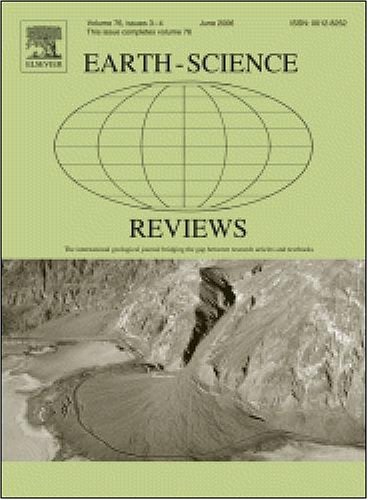Numerical modelling of coupled climate, tectonics, and surface processes on the eastern Himalayan syntaxis
IF 10
1区 地球科学
Q1 GEOSCIENCES, MULTIDISCIPLINARY
引用次数: 0
Abstract
The geosphere dynamics near Earth's surface is a key scientific issue for understanding how Earth system works. However, the specific mechanisms underlying the interplay between these geospheres still remain unclear. Here, we take the eastern Himalayan syntaxis, the most typical region undergoing ferocious geosphere interplay on the planet, as our primary research area. We incorporated a topography-dependent precipitation model into traditional geomorphological-thermomechanical modelling and conducted over 200 experiments to investigate the interplay between climate, tectonics, and surface processes during the evolution of the orogenic wedge. The results show that a distinct type of orogenic wedge emerges when the convergence rate and average precipitation fall within specific ranges determined by the crustal geothermal field. Within this type of orogenic wedge, a sustained, stationary, localized and relatively rapid erosion process can be established on the windward flank. This can further induce sustained and rapid uplift of rocks, exhumation and deformation, forming a large-scale antiform, which exhibits a certain degree of similarity to the eastern Himalayan syntaxis. We propose that the formation of the eastern Himalayan syntaxis share this similar mechanism. Our analysis of the results indicates that the influences of climatic forcing, tectonic forcing, and geothermal field on the evolution of orogenic wedge can be integrated into a single parameter (), and we propose that 0.24≤≤0.45 is a necessary condition for the development of a syntaxis, which provides a quantitative constraint on the formation of a syntaxis for the first time.
喜马拉雅山脉东部合成地貌的气候、构造和地表过程耦合数值模拟
地球表面附近的地圈动力学是了解地球系统如何运作的一个关键科学问题。然而,这些地圈之间相互作用的具体机制仍不清楚。在这里,我们以喜马拉雅山脉东部的合成地层为主要研究区域,该区域是地球上地圈相互作用最为激烈的典型区域。我们在传统的地貌-热力-力学模型中加入了一个地形依赖降水模型,并进行了 200 多次实验,研究造山楔演化过程中气候、构造和地表过程之间的相互作用。结果表明,当辐合率和平均降水量在地壳地热田确定的特定范围内时,就会出现一种独特类型的造山楔。在这种类型的造山楔中,迎风侧可以形成持续、静止、局部和相对快速的侵蚀过程。这可进一步引起岩石持续而快速的隆起、掘起和变形,形成大尺度的蚁状构造,与喜马拉雅山脉东部的合成地貌有一定程度的相似性。我们认为,喜马拉雅山东部合成岩的形成也具有这种相似的机制。我们的分析结果表明,气候强迫、构造强迫和地热田对造山楔演化的影响可以整合为一个参数(EF),并提出0.24≤EF≤0.45是合成地体发育的必要条件,首次为合成地体的形成提供了定量约束。
本文章由计算机程序翻译,如有差异,请以英文原文为准。
求助全文
约1分钟内获得全文
求助全文
来源期刊

Earth-Science Reviews
地学-地球科学综合
CiteScore
21.70
自引率
5.80%
发文量
294
审稿时长
15.1 weeks
期刊介绍:
Covering a much wider field than the usual specialist journals, Earth Science Reviews publishes review articles dealing with all aspects of Earth Sciences, and is an important vehicle for allowing readers to see their particular interest related to the Earth Sciences as a whole.
 求助内容:
求助内容: 应助结果提醒方式:
应助结果提醒方式:


